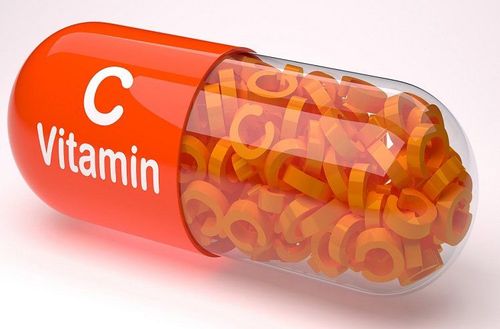This is an automatically translated article.
The article was professionally consulted by Dr. Phan Dinh Thuy Tien - General Internal Medicine - Department of Medical Examination & Internal Medicine - Vinmec Nha Trang International General Hospital.Vitamin C is useful in repelling other diseases such as for other infections including gum disease, acne; bronchitis, human immunodeficiency disease (HIV)....
1. Uses of vitamin C
Vitamin C deficiency: Taking vitamin C by mouth or by injection helps prevent and treat vitamin C deficiency, including scurvy. In addition, taking vitamin C can reverse the problems associated with scurvy.
1.1. Likely Effective Iron Absorption: Taking vitamin C along with iron might increase the amount of iron the body absorbs in adults and children. Hereditary disorder in infants - tyrosinemia: Taking vitamin C by mouth or by injection improves a genetic disorder in infants where too high blood levels of the amino acid tyrosine are one of many causes (vitamin C). may reduce amino acid tyrosine levels). Age-related vision loss (age-related macular degeneration; AMD): Taking vitamin C, vitamin E, beta-carotene, and zinc helps prevent AMD from getting worse in people with multiple predisposing factors. make AMD progress. It's too early to know if this combination helps people with a lower risk of developing AMD. Also, it's too early to know if vitamin C will help prevent AMD. Increased protein in the urine (albuminuria): Taking vitamin C plus vitamin E might reduce protein in the urine in people with diabetes.

Uống vitamin C cộng với vitamin E có thể làm giảm protein trong nước tiểu ở những người mắc bệnh tiểu đường
Arrhythmias (atrial fibrillation): Taking vitamin C before and for a few days after heart surgery helps prevent arrhythmias after heart surgery. Colonoscopy before a colonoscopy: Before a person undergoes a colonoscopy, he or she must be sure to have a colon cleanse. This cleaning is called bowel prep. Patients need to drink 4 liters of water that has been mixed with medicine to make sure the intestines are cleaned. If vitamin C is added, the patient will only need to drink 2 liters. This makes it easier for the patient to perform. This method also has few side effects. Specific drugs containing vitamin C for bowel preparation such as MoviPrep, Salix Parmoffees.
Common cold: There is some controversy about the effectiveness of vitamin C in treating the common cold. However, most research shows that taking 1-3 grams of vitamin C can shorten the course of a cold by 1 to 1.5 days. Taking vitamin C does not prevent colds. Complex regional pain syndrome (CRPS): Taking vitamin C after surgery or injury to the arm or leg seems to prevent complex regional pain syndrome from developing. Erythema after cosmetic procedures on the skin: Using a lotion containing vitamin C can reduce redness after laser resurfacing for scarring and wrinkle removal. Exercise-induced upper respiratory tract infections: Taking vitamin C before intense exercise, such as running a marathon, may prevent upper respiratory tract infections that can occur after exercise. heavy sex. Gastritis: Some medications used to treat H.pylori infection can worsen gastritis. Taking vitamin C along with the medicine omeprazole might reduce this side effect.
Gout: Higher intake of vitamin C from the diet may reduce the risk of gout in men. But vitamin C does not help with gout. Gastritis aggravated by medicine used to treat H.pylori infection : Some medicines used to treat H.pylori infection can worsen gastritis. Taking vitamin C along with the medicine omeprazole might reduce this side effect. Hemolytic anemia: Taking vitamin C supplements may help control anemia in people on dialysis. High blood pressure: Taking vitamin C along with antihypertensive drugs helps lower systolic blood pressure (the upper number of blood pressure numbers) by a small amount. But it doesn't seem to lower diastolic pressure (the bottom number of blood pressure). Taking vitamin C does not seem to lower blood pressure when taken without it in combination with antihypertensive drugs. High cholesterol: Taking vitamin C might lower lipoprotein cholesterol by a small amount (LDL or "bad") in people with high cholesterol. Lead poisoning: Consuming dietary vitamin C seems to reduce blood lead levels. Prolonged chest pain: In some people taking chest pain relievers, the body will increase the tolerance and over time the medicine will wear off. Taking vitamin C seems to help these drugs, such as nitroglycerine, work longer. Osteoarthritis: Taking vitamin C from dietary sources or from calcium ascorbate supplements seems to prevent cartilage loss and worsening of symptoms in people with osteoarthritis. Physical activity: Eating more foods containing vitamin C as part of a diet can improve physical performance and muscle strength in the elderly. Additionally, vitamin C supplementation may improve oxygen intake during adolescent exercise. However, taking vitamin C with vitamin E does not seem to improve muscle strength in older men who are also exercising. Sunburn: Taking vitamin C by mouth or applying it to the skin along with vitamin E can prevent sunburn. But taking vitamin C alone does not prevent sunburn. Wrinkled skin: Skin creams containing vitamin C work to slow down the skin aging process.

Kem dưỡng có chứa vitamin C giúp làm chậm quá trình lão hóa da
1.2. May be ineffective Bronchitis: Taking vitamin C by mouth does not seem to work for bronchitis. Asthma: Some people with asthma have low blood levels of vitamin C. But taking vitamin C doesn't seem to reduce asthma risk or improve asthma symptoms in people who already have asthma. Hardening of the arteries (atherosclerosis): Higher intake of vitamin C as part of the diet does not reduce the risk of atherosclerosis. Also, taking vitamin C supplements doesn't seem to prevent atherosclerosis from getting worse in most people with the condition. Bladder cancer: Taking vitamin C supplements doesn't seem to prevent bladder cancer or reduce bladder cancer-related deaths in men. Colon cancer: Higher intake of vitamin C from food or supplements does not reduce the risk of cancer in the colon or rectum. Fractures: Taking vitamin C does not seem to improve function, symptoms, or healing rates in people with wrist fractures. Peptic ulcer disease caused by HP : Taking vitamin C along with medicines used to treat H.pylori infection does not seem to eliminate H. pylori better than taking the medicine alone.
Nerve damage (genetic motor and sensory neuropathy): Charcot-Marie-Tooth disease is a group of genetic disorders that cause nerve damage. Taking vitamin C doesn't seem to prevent nerve damage from getting worse in people with this condition. Eye damage associated with interferon drugs: Taking vitamin C by mouth does not seem to prevent eye damage in people taking interferon therapy for liver disease. Leukemia: Taking vitamin C does not seem to prevent leukemia or death from leukemia in men. Lung cancer: Taking vitamin C, alone or with vitamin E, does not seem to prevent lung cancer or death from lung cancer. Melanoma: Taking vitamin C, alone or with vitamin E, does not prevent melanoma or death from melanoma. Overall risk of death: High blood levels of vitamin C are associated with a reduced risk of all-cause mortality. However, taking vitamin C supplements along with other antioxidants doesn't seem to prevent death. Pancreatic cancer: Taking vitamin C along with beta-carotene plus vitamin E does not prevent pancreatic cancer. High blood pressure during pregnancy (pre-eclampsia): Most research shows that taking vitamin C with vitamin E does not prevent high blood pressure during pregnancy. Prostate cancer: Taking vitamin C supplements does not seem to prevent prostate cancer. Skin problems associated with cancer treatments: Applying a vitamin C solution to the skin does not prevent skin problems caused by radiation treatments.
2. How to use vitamin C effectively

Có thể sử dụng vitamin C thường xuyên để đạt được lợi ích cao nhất từ nó
Take this vitamin by mouth with or without food, usually 1-2 times daily. Follow all directions on the product package, or as directed by your doctor.
If you are taking extended-release capsules, swallow them whole. Do not crush or chew extended-release capsules or tablets. Doing so can release the drug all at once, increasing the risk of side effects.
Also, do not split extended-release tablets unless told to do so by your doctor or pharmacist. Swallow the tablet whole or split it without crushing or chewing. Take this product with a full glass of water (8 ounces / 240 ml) unless your doctor directs you otherwise.
If you are taking a wafer or chewable tablet, chew thoroughly, then swallow. If you are taking a lozenge, place the lozenge in your mouth to let it dissolve.
If taking vitamin C in powder form, mix thoroughly in water or suitable soft food and stir well. Use immediately after mixing and use up, do not save for next time. If you are using the liquid form of this vitamin, carefully measure the dose using a special measuring instrument/spoon. Do not use household spoon as you may not get the correct dose.
Dosage is based on medical condition and response to treatment.
Use this vitamin regularly to get the most benefit from it. Use it at a fixed time to remember to use it every day.
Seek immediate medical attention if you have any allergic reactions, or unusual symptoms after taking vitamin C.
Please dial HOTLINE for more information or register for an appointment HERE. Download MyVinmec app to make appointments faster and to manage your bookings easily.
Article referenced source: Webmd.com












